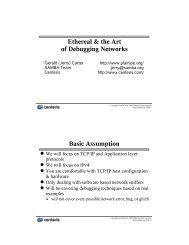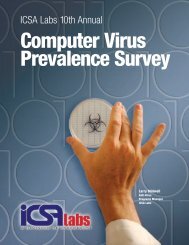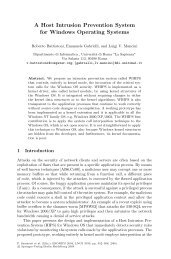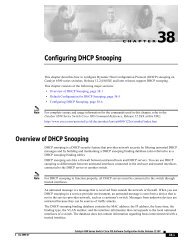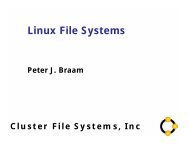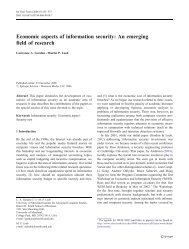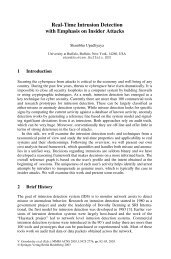Advanced Windows 2000 Rootkit Detection (Execution Path Analysis)
Advanced Windows 2000 Rootkit Detection (Execution Path Analysis)
Advanced Windows 2000 Rootkit Detection (Execution Path Analysis)
Create successful ePaper yourself
Turn your PDF publications into a flip-book with our unique Google optimized e-Paper software.
*** RegEnumKey-clear.trace<br />
--- RegEnumKey-current.trace<br />
***************<br />
*** 273,278 ****<br />
--- 273,281 ----<br />
0x80416f60<br />
0x80416f63<br />
0x80416f65<br />
+ 0x80416f67<br />
+ 0x80416f6a<br />
+ 0x80416f6d<br />
0x80416f74<br />
0x80416f76<br />
0x80416f77<br />
***************<br />
*** 1002,1007 ****<br />
--- 1005,1013 ----<br />
0x80416f60<br />
0x80416f63<br />
0x80416f65<br />
+ 0x80416f67<br />
+ 0x80416f6a<br />
+ 0x80416f6d<br />
0x80416f74<br />
0x80416f76<br />
0x80416f77<br />
Figure 6. Differences between two trace dumps (only addresses). We see that 3 additional instruction<br />
has been executed two times (after 275th and 1007th instruction).<br />
<strong>Detection</strong> of ‘offset-in-the-code’ changes<br />
Imagine a rootkit which works similarly to fu rootkit ([3]) mentioned above, but instead<br />
of removing objects from PsActiveProcessList its removes the thread objects from the<br />
internal dispatcher data structures. We said that its not possible, since our hidden<br />
process will not get any CPU time for execution...<br />
However we can imagine that rootkit will also change to scheduler code in the fashion it<br />
will use different offsets (within thread objects) to maintain a list. In other words we<br />
change scheduler code to use different (“shadow”) list. But only the scheduler will be<br />
changed to use this “new” list, everybody else (including IDS tools, like those mentioned<br />
above which can read internal kernel structures) will be using the old list… See figure 7.<br />
8



